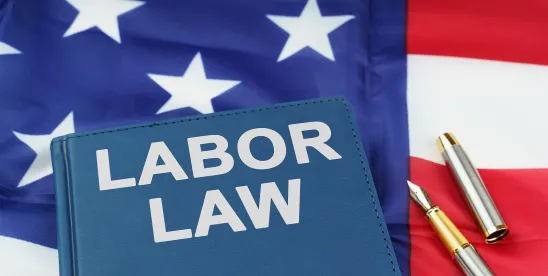On July 16, 2025, the U.S. Senate Committee on Health, Education, Labor, and Pensions (HELP) held a hearing on President Donald Trump’s nominations of Brittany Panuccio to be a member of the U.S. Equal Employment Opportunity Commission (EEOC) and Crystal Carey to be general counsel of the National Labor Relations Board (NLRB). The hearing indicated that both nominees would further the administration’s labor and employment policies, though some senators raised concerns regarding Carey’s position on mandatory employee informational meetings.
Quick Hits
- The Senate HELP Committee held hearings on the nominations of Brittany Panuccio to be a commissioner of the EEOC and Crystal Carey to be NLRB general counsel.
- Panuccio’s potential confirmation could shift the EEOC’s focus to rule changes regarding antidiscrimination enforcement, while Carey faces questions about her position on enforcing NLRB precedents, particularly regarding mandatory employee meetings.
President Trump nominated Panuccio, who is currently an assistant U.S. attorney in the Southern District of Florida, on May 6, 2025, to fill one of three open seats on the EEOC. On March 25, 2025, the president nominated Carey, a partner at a private practice law firm with eight years of experience as an attorney with the NLRB, to take over for Acting General Counsel William B. Cowen. The full Senate must confirm both nominations.
EEOC Commissioner – Brittany Panuccio
Panuccio told the committee that she would “vigorously enforce” Title VII of the Civil Rights Act of 1964 and “President Trump’s agenda to combat” diversity, equity, and inclusion (DEI) programs and similar programs that the administration argues unlawfully give preferences to certain groups. “DEI is a broad concept, but it is just one label that is used to describe certain conduct,” Panuccio said. “Title VII does not include any exceptions for diversity or DEI.”
In that light, Senator Jon Husted (R-OH) asked Panuccio about the impact of the Supreme Court of the United States’ recent decision in Ames v. Ohio Department of Youth Services, in which the Court held that employees from majority groups do not have a higher evidentiary standard to bring employment discrimination claims. Panuccio said the Ames case, in her opinion, “reaffirms the EEOC’s long-standing position that there is no right or wrong type of plaintiff.”
Further, in response to questions about the independence of the EEOC, Panuccio’s responses suggested that she would take President Trump’s lead. Senator Tammy Baldwin (D-WI) pressed Panuccio on whether the EEOC must follow the president’s orders, asking directly whether, if the president directed the agency to no longer pursue sex-based discrimination claims on behalf of women, the agency would have to stop such investigations. Panuccio responded that “the president is the head of the executive branch” and that “the agency has a finite amount of resources and prosecutorial discretion, so it can direct those resources as it best sees fit to execute its mission.”
EEOC Implications
Panuccio’s confirmation would give the five-member commission a quorum with two Republican commissioners and one Democratic commissioner, following the president’s discharge of two sitting Democratic commissioners. Title VII provides that no more than three commissioners may be from the same political party. The quorum with a Republican majority would allow the EEOC to vote to change rules, guidance, and policies to carry out the administration’s priorities, including:
- issuing formal guidance and pursuing more aggressive enforcement with regard to “illegal” DEI programs;
- eliminating or significantly narrowing Pregnant Workers Fairness Act guidance and regulations, including abortion being considered a pregnancy-related condition;
- eliminating or significantly narrowing the inclusion of gender identity protections in the EEOC’s sexual harassment guidance;
- increasing enforcement of national origin discrimination and so-called anti-American bias; and
- more aggressively enforcing anti-discrimination and anti-harassment protections based on religion, particularly claims related to anti-Christian and anti-Semitic bias.
NLRB General Counsel – Crystal Carey
While the senators’ questioning of Carey was largely predictable, with Democratic senators asking whether she thought the NLRB was unconstitutional and whether President Trump’s dismissal of former NLRB Member Gwynne Wilcox without cause was lawful, there were bipartisan questions about the current backlog of cases at the NLRB and whether staffing levels were sufficient.
In response to questions about the current case backlog at the Board, Carey theorized that her predecessor’s penchant for stretching the bounds of the law might have strained agency resources, contributing to the backlog.
She further stated she would need “a full organizational assessment” to determine how resources and staffing were being used and whether they could be better allocated, suggesting that if necessary to effectuate the NLRB’s mission to enforce the National Labor Relations Act (NLRA), she would work with Congress and the White House to ensure the agency could meet its “goals.”
At the same time, some senators, particularly Senator Josh Hawley (R-MO), questioned Carey about her support for mandatory information meetings on unionization, or so-called captive-audience meetings, which the NLRB found violated the NRLA in November 2024. Senator Hawley basically sought to get her to commit to unequivocally enforcing the NLRB’s decision full stop.
During the hearing, Carey committed to upholding long-standing Board precedent and to applying the law as written. Still, Carey noted that “prosecutorial discretion rests with the general counsel.”
NLRB Implications
The NLRB general counsel plays an important role in overseeing the investigation and prosecution of alleged labor violations and in setting enforcement policies. Since being appointed as acting general counsel, Cowen has sought to undo the policy agenda of his predecessor, former General Counsel Jennifer Abruzzo, as part of reshaping policy priorities under the Trump administration.
The NLRB is facing a backlog of cases, which has delayed resolution for parties. Further, the NLRB is currently without a quorum following President Trump’s discharge of NLRB Member Gwynne Wilcox without cause, which Wilcox is seeking to overturn through the courts. Without a quorum, the NRLB cannot issue precedential decisions.
If confirmed as general counsel, Carey would not be able to address the current lack of quorum at the NLRB, though President Trump named a pair of nominees on July 17, 2025, who, if confirmed, would give the NLRB a quorum. However, Carey’s policies could set the stage for a rebalancing of the labor-management landscape after it was tilted in favor of organized labor during the Biden administration.
Next Steps
The nominations of Panuccio and Carey must still be voted out of committee and confirmed by the full Senate before the officials assume their respective positions. Republicans currently outnumber Democrats on the HELP Committee, 12–11. Voting to advance the nominees is anticipated to closely follow party lines. However, Senator Hawley’s questioning raises a measure of doubt about whether he will approve Carey for the NLRB general counsel. There is a process by which the full Senate can vote to discharge a nomination out of committee, but that process takes time.






 />i
/>i
